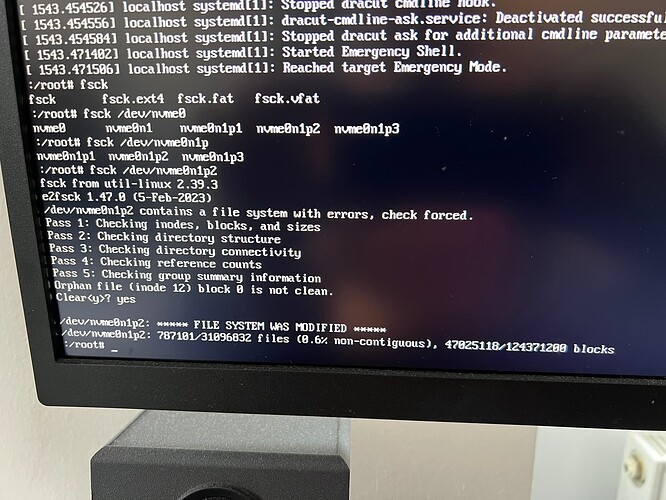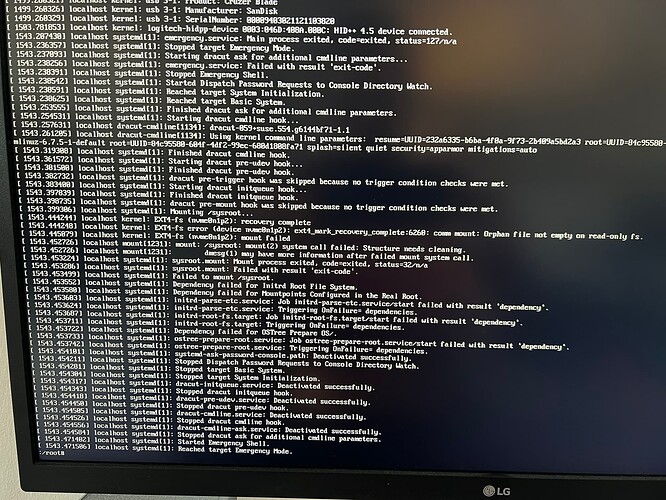Most times after updates are installed on my ext4 partition it fails to boot the second reboot after updates because the partition is marked as dirty. Then I have to manually run fschk to continue to boot. It seems when installing updates, it doesn’t unmount the partition cleanly before rebooting.
This is strange. All my Tumbleweed/Leap machines use ext4 for / and /home and never hit such an problem. Maybe this is due to some fstab settings. Maybe share more informations about your system. Partition layout, fstab content, non standard services that you use/run and more…
I haven’t made any changes fromt he default Network Install. But here are my settings:
UUID=232a6335-b6ba-4f0a-9f73-2b409a5bd2a3 swap swap defaults 0 0
UUID=84c95580-604f-4df2-99ec-680d1808fa71 / ext4 defaults 0 1
UUID=C099-397E /boot/efi vfat utf8 0 2
Hardware info:
localhost.localdomain
description: Notebook
product: Victus by HP Laptop 16-e1xxx (697R5EA#ACQ)
vendor: HP
version: Chassis Version
serial: 5CD2275GRW
width: 64 bits
capabilities: smbios-3.4.0 dmi-3.4.0 smp vsyscall32
configuration: boot=normal chassis=notebook family=103C_5335M7 HP VICTUS sku=697R5EA#ACQ uuid=32444335-3732-4735-5257-5c60ba610c24
*-core
description: Motherboard
product: 8A22
vendor: HP
physical id: 0
version: 19.75
serial: PPVWB018JGU05P
slot: Base Board Chassis Location
*-firmware
description: BIOS
vendor: AMI
physical id: 0
version: F.19
date: 07/14/2023
size: 64KiB
capacity: 16MiB
capabilities: pci upgrade shadowing cdboot bootselect edd smartbattery biosbootspecification netboot uefi
*-cache:0
description: L1 cache
physical id: d
slot: L1 - Cache
size: 512KiB
capacity: 512KiB
clock: 1GHz (1.0ns)
capabilities: pipeline-burst internal write-back unified
configuration: level=1
*-cache:1
description: L2 cache
physical id: e
slot: L2 - Cache
size: 4MiB
capacity: 4MiB
clock: 1GHz (1.0ns)
capabilities: pipeline-burst internal write-back unified
configuration: level=2
*-cache:2
description: L3 cache
physical id: f
slot: L3 - Cache
size: 16MiB
capacity: 16MiB
clock: 1GHz (1.0ns)
capabilities: pipeline-burst internal write-back unified
configuration: level=3
*-cpu
description: CPU
product: AMD Ryzen 7 6800H with Radeon Graphics
vendor: Advanced Micro Devices [AMD]
physical id: 10
bus info: cpu@0
version: 25.68.1
serial: Unknown
slot: FP7
size: 1680MHz
capacity: 4785MHz
width: 64 bits
clock: 100MHz
capabilities: lm fpu fpu_exception wp vme de pse tsc msr pae mce cx8 apic sep mtrr pge mca cmov pat pse36 clflush mmx fxsr sse sse2 ht syscall nx mmxext fxsr_opt pdpe1gb rdtscp x86-64 constant_tsc rep_good nopl nonstop_tsc cpuid extd_apicid aperfmperf rapl pni pclmulqdq monitor ssse3 fma cx16 sse4_1 sse4_2 x2apic movbe popcnt aes xsave avx f16c rdrand lahf_lm cmp_legacy svm extapic cr8_legacy abm sse4a misalignsse 3dnowprefetch osvw ibs skinit wdt tce topoext perfctr_core perfctr_nb bpext perfctr_llc mwaitx cpb cat_l3 cdp_l3 hw_pstate ssbd mba ibrs ibpb stibp vmmcall fsgsbase bmi1 avx2 smep bmi2 erms invpcid cqm rdt_a rdseed adx smap clflushopt clwb sha_ni xsaveopt xsavec xgetbv1 xsaves cqm_llc cqm_occup_llc cqm_mbm_total cqm_mbm_local clzero irperf xsaveerptr rdpru wbnoinvd cppc arat npt lbrv svm_lock nrip_save tsc_scale vmcb_clean flushbyasid decodeassists pausefilter pfthreshold avic v_vmsave_vmload vgif v_spec_ctrl umip pku ospke vaes vpclmulqdq rdpid overflow_recov succor smca fsrm debug_swap cpufreq
configuration: cores=8 enabledcores=8 microcode=171983106 threads=16
*-memory
description: System Memory
physical id: 12
slot: System board or motherboard
size: 64GiB
*-bank:0
description: SODIMM Synchronous Unbuffered (Unregistered) 5600 MHz (0.2 ns)
product: CT32G56C46S5.M16B2
vendor: Unknown
physical id: 0
serial: E79FF03A
slot: Bottom - Slot 1 (left)
size: 32GiB
width: 64 bits
clock: 1305MHz (0.8ns)
*-bank:1
description: SODIMM Synchronous Unbuffered (Unregistered) 5600 MHz (0.2 ns)
product: CT32G56C46S5.M16B2
vendor: Unknown
physical id: 1
serial: E79FF28A
slot: Bottom - Slot 2 (right)
size: 32GiB
width: 64 bits
clock: 1305MHz (0.8ns)
*-pci:0
description: Host bridge
product: Family 17h-19h PCIe Root Complex
vendor: Advanced Micro Devices, Inc. [AMD]
physical id: 100
bus info: pci@0000:00:00.0
version: 01
width: 32 bits
clock: 33MHz
*-generic UNCLAIMED
description: IOMMU
product: Family 17h-19h IOMMU
vendor: Advanced Micro Devices, Inc. [AMD]
physical id: 0.2
bus info: pci@0000:00:00.2
version: 00
width: 32 bits
clock: 33MHz
capabilities: msi ht bus_master cap_list
configuration: latency=0
*-pci:0
description: PCI bridge
product: Family 17h-19h PCIe GPP Bridge
vendor: Advanced Micro Devices, Inc. [AMD]
physical id: 1.1
bus info: pci@0000:00:01.1
version: 00
width: 32 bits
clock: 33MHz
capabilities: pci pm pciexpress msi ht normal_decode bus_master cap_list
configuration: driver=pcieport
resources: irq:36 ioport:f000(size=4096) memory:fb000000-fc0fffff ioport:fb00000000(size=4328521728)
*-display
description: VGA compatible controller
product: GA107M [GeForce RTX 3050 Ti Mobile]
vendor: NVIDIA Corporation
physical id: 0
bus info: pci@0000:01:00.0
logical name: /dev/fb0
version: a1
width: 64 bits
clock: 33MHz
capabilities: pm msi pciexpress vga_controller bus_master cap_list rom fb
configuration: depth=32 driver=nvidia latency=0 mode=1920x1080 visual=truecolor xres=1920 yres=1080
resources: iomemory:fb0-faf iomemory:fc0-fbf irq:99 memory:fb000000-fbffffff memory:fb00000000-fbffffffff memory:fc00000000-fc01ffffff ioport:f000(size=128) memory:fc000000-fc07ffff
*-pci:1
description: PCI bridge
product: Family 17h-19h PCIe GPP Bridge
vendor: Advanced Micro Devices, Inc. [AMD]
physical id: 1.2
bus info: pci@0000:00:01.2
version: 00
width: 32 bits
clock: 33MHz
capabilities: pci pm pciexpress msi ht normal_decode bus_master cap_list
configuration: driver=pcieport
resources: irq:37 memory:fcc00000-fccfffff
*-nvme
description: NVMe device
product: MTFDKBA512TFH-1BC1AABHA
vendor: Micron Technology Inc
physical id: 0
bus info: pci@0000:02:00.0
logical name: /dev/nvme0
version: HPS0043
serial: UMDMC01SCGHY20
width: 64 bits
clock: 33MHz
capabilities: nvme pm msix pciexpress nvm_express bus_master cap_list
configuration: driver=nvme latency=0 nqn=nqn.2014.08.org.nvmexpress:13441344UMDMC01SCGHY20 MTFDKBA512TFH-1BC1AABHA state=live
resources: irq:52 memory:fcc00000-fcc03fff
*-namespace:0
description: NVMe disk
physical id: 0
logical name: hwmon1
*-namespace:1
description: NVMe disk
physical id: 2
logical name: /dev/ng0n1
*-namespace:2
description: NVMe disk
physical id: 1
bus info: nvme@0:1
logical name: /dev/nvme0n1
size: 476GiB (512GB)
capabilities: gpt-1.00 partitioned partitioned:gpt
configuration: guid=404ce755-6ae0-412b-be35-2b46f9b2ea55 logicalsectorsize=512 sectorsize=512 wwid=eui.000000000000000100a075223741ccc6
*-volume:0 UNCLAIMED
description: Windows FAT volume
vendor: mkfs.fat
physical id: 1
bus info: nvme@0:1,1
version: FAT32
serial: c099-397e
size: 510MiB
capacity: 511MiB
capabilities: boot fat initialized
configuration: FATs=2 filesystem=fat
*-volume:1
description: EXT4 volume
vendor: Linux
physical id: 2
bus info: nvme@0:1,2
logical name: /dev/nvme0n1p2
logical name: /
version: 1.0
serial: 84c95580-604f-4df2-99ec-680d1808fa71
size: 474GiB
capabilities: journaled extended_attributes large_files huge_files dir_nlink recover 64bit extents ext4 ext2 initialized
configuration: created=2024-01-19 20:22:48 filesystem=ext4 lastmountpoint=/ modified=2024-02-13 10:32:12 mount.fstype=ext4 mount.options=rw,relatime mounted=2024-02-13 10:32:41 state=mounted
*-volume:2
description: Linux swap volume
vendor: Linux
physical id: 3
bus info: nvme@0:1,3
logical name: /dev/nvme0n1p3
version: 1
serial: 232a6335-b6ba-4f0a-9f73-2b409a5bd2a3
size: 2GiB
capacity: 2GiB
capabilities: nofs swap initialized
configuration: filesystem=swap pagesize=4096
This isn’t particularly helpful but I switched to btrfs after having same issues on both fedora and tumbleweed on an nvme and even going so far as re-installing on a spare ssd with same result. It just became too infuriating to troubleshoot further.
Similar here. I’ve always used ext4 for / and /home as well. Both with spinning-rust and now ssd. This is with Tumbleweed since 2018 and Leap before that. Maybe it’s not ext4 but something is causing an unclean shutdown, like a GPU driver or such, or something during shutdown causing writes without a final sync.
If this problem is reproducible it seems to It would help the list the details on what fsck is finding.
Ideally you would like to run fsck on the driver after the update before the reboot but it looks that is not possible at least on ext4. I am running with XFS and learned, searching for this that XFS has xfs_check for this.
It happens randomly but the next time it happens, I’ll be prepared with an usb stick to save the logs as well as the command output.
You did not explain how you got from the first to the second screen.
The errror means that filesystem was not cleanly unmounted (which is not surprising for a root filesystem). The problem is that dracut attempts to initially mount root as read-only and that is not possible in this case. Try adding rw kernel option - it should force read-write mount and bypass this issue.
Sorry the photos are out of sequence. The second screen is a screenshot of the rdsoreport .txt. Then I ran fschk on the nvme drive to repair the issue to continue booting. To get into situation, it happens sometimes when installing updates when it reboots the second time. The update sequence is not always unmounting the volume cleanly when using ext4. I would prefer solve the issue than forcing mounting it when it’s not unmounted cleanly.
Thanks for the screenshot, clear.
I would check the journal if the shutdown was clean.
This topic was automatically closed 30 days after the last reply. New replies are no longer allowed.

